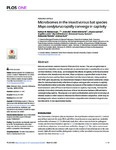Microbiomes in the insectivorous bat species Mops condylurus rapidly converge in captivity
Edenborough, Kathryn M.
Mu, Andre
Mühldorfer, Kristin
Lechner, Johanna
Lander, Angelika
Bokelmann, Marcel
Couacy-Hymann, Emmanuel
Radonic, Aleksandar
Bats are well known reservoir hosts for RNA and DNA viruses. The use of captive bats in research has intensified over the past decade as researchers aim to examine the virus-reservoir host interface. In this study, we investigated the effects of captivity on the fecal bacterial microbiome of an insectivorous microbat, Mops condylurus, a species that roosts in close proximity to humans and has likely transmitted viral infections to humans. Using amplicon 16S rRNA gene sequencing, we characterized changes in fecal bacterial community composition for individual bats directly at the time of capture and again after six weeks in captivity. We found that microbial community richness by measure of the number of observed operational taxonomic units (OTUs) in bat feces increases in captivity. Importantly, we found the similarity of microbial community structures of fecal microbiomes between different bats to converge during captivity. We propose a six week-acclimatization period prior to carrying out infection studies or other research influenced by the microbiome composition, which may be advantageous to reduce variation in microbiome composition and minimize biological variation inherent to in vivo experimental studies.
Files in this item

